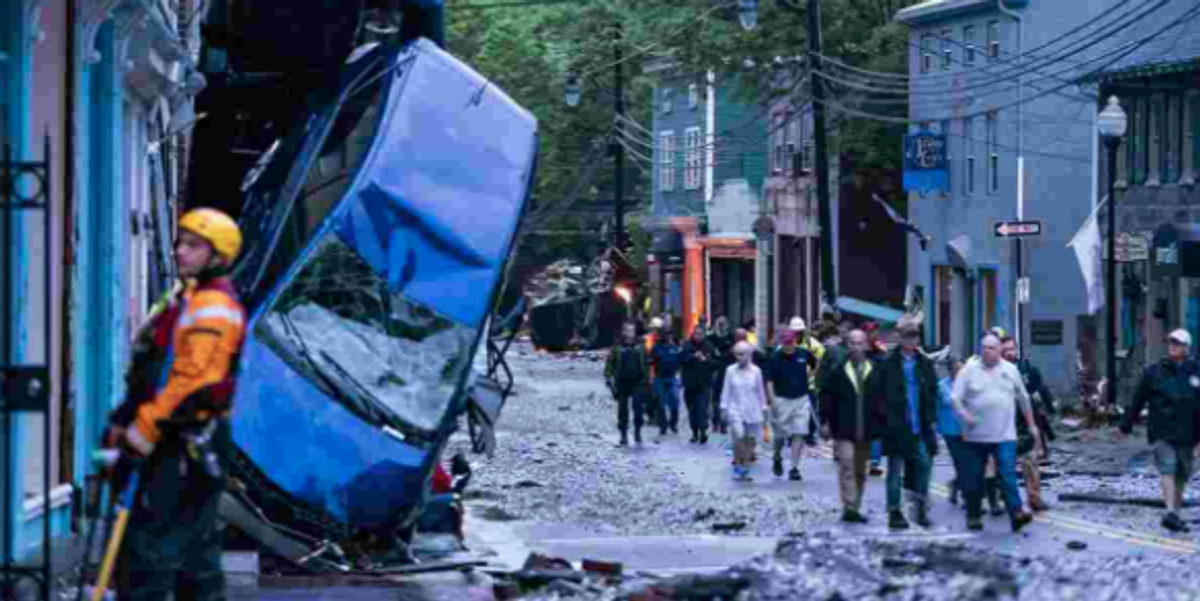
Weekend Reader: Communicating climate, a guided tour
Covering climate change as a disaster scenario isn't a strategic mistake, it's a necessity.
Monday's NBC Nightly News led with the disastrous flash flood.
Following the traditional mangling of what a "thousand year flood" is, the reporter asked the county executive if something other than "bad luck" caused the second such flood in three years. There was no mention of climate, nor of the poor land use policies believed to be another factor. (Key moment is at 3:13 in this video.)
Enter good ol' Al Roker. Methodically, rapidly and good naturedly, the veteran meteorologist laid out the link between climate change and ungodly downpours on Thursday's NBC Today Show in less than 40 seconds. So it can be done.
Also this week, Harvard's Shorenstein Center ran a lengthy piece by veteran NPR correspondent and Shorenstein fellow Elizabeth Arnold. Amidst many useful points about news coverage of climate, Arnold makes the fundamental point that it's too gloomy to connect with news consumers.
Funny, I had always wondered why Schindler's List hadn't been re-cast for Broadway as a musical comedy. But seriously, folks.... Arnold prescribes a greater mix of solutions-oriented stories to leave readers, listeners, and viewers with a message of hope. Easy for an NPR veteran to say, but just try that over at NBC Nightly or cable news, where I toiled for 18 years.
Case in point: Media Matters for America, a left-of-center press watchdog nonprofit, estimated that Roseanne Barr's racist tweet got 16 times as much cable news attention as the news that Puerto Rico's death toll in Hurricane Maria may have been understated by a factor of 70. A factor of 70. And while there's no actual data on this, I'm guessing that Roseanne's linking racism to her taking Ambien got more news coverage than scientists linking climate change to weather disasters like Ellicott City.
These days -- particularly in these Trump days -- many of the key climate stories are political ones. I'll pre-assign a Peabody Award to any story that can turn Washington's climate politics to a positive, solutions-oriented piece. The bottom line as I see it, is that we're dealing with the classic symptoms of addiction, and the patient, hereinafter known as "us," doesn't yet know we have a problem.
Covering climate change as a disaster scenario isn't a strategic mistake, it's a necessity.
Having said that, there are a few valuable places that specialize in monitoring climate coverage, or in exploring how these issues are communicated by scientists, activists, and journalists.
Climate Feedback is a California-based group dedicated to critiquing mainstream press coverage of climate scientists. Its science-heavy staff and advisors pick apart news stories and opinion pieces for scientific accuracy, conspicuously picking apart a Wall Street Journal editorial that exclusively relied on climate-denying sources.
Media Matters for America is a news watchdog site whose political biases, and Democratic party loyalties, are clear. But they offer solid research and frequently rapid-response analysis, like the one above on Al Roker's flood coverage when coverage of climate change or other environmental issues hits or misses the mark.
Two academic outposts cover polling data and the receptiveness of audiences for climate news and information. The Yale Program on Climate Change Communication and the Center for Climate Change Communication often partner on projects. At the University of Colorado, the Media and Climate Change Observatory does monthly content counts on how heavily (or not) climate issues are being covered internationally.
Top Weekend News
Pope Francis plans to meet with business giants like BP and Black Rock on climate change. (Axios)
The New York Times has a deep dive on EPA Administrator Scott Pruitt's cozy relationship with a coal baron.
From PRI's Living On Earth, Steve Curwood talks with two authors of the study estimating a huge death toll in Puerto Rico from Hurricane Maria. The numbers are......complicated.
From Bob Berwyn at Inside Climate News: Some hurricane experts say it's time to create Category Six.
Opinion Pieces and Editorials
The New York Times editorializes on Trump's "climate foolishness."
Paul Krugman, The Times's Nobel Laureate economist, weighs in on "Coal, Cash and Bad Faith."
NPR's Scott Simon with an essay on why Roseanne and Samantha Bee got far more attention than the news on Puerto Rico's death toll.
This Week in Trump
The climate movement tries to outmaneuver President Trump. (LA Times)
Podcasts of Note
On the Commonwealth Club's Climate One podcast, Greg Dalton talks with three of California's top gubernatorial candidates.
From PRI's Living On Earth, EHN's Peter Dykstra and Steve Curwood take a look beyond the headlines at a tree-sitting Appalachian pipeline protest, and discuss Forest Service workers who are taking construction lessons from beavers.
From last August, but perfect for the start of Atlantic Hurricane season: The Weather Channel's Mike Bettes and Dr. Rick Knabb show what you'll need for a hurricane preparedness kit.
The Revelatormapped light pollution, and the huge new contributions from fracking operations. It's bad news for migratory birds.














